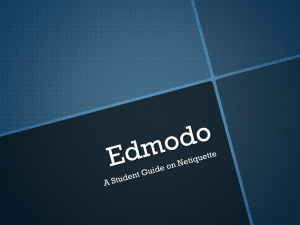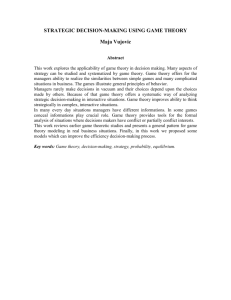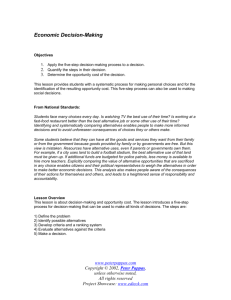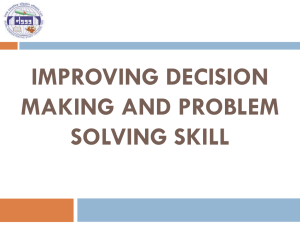Overview
advertisement
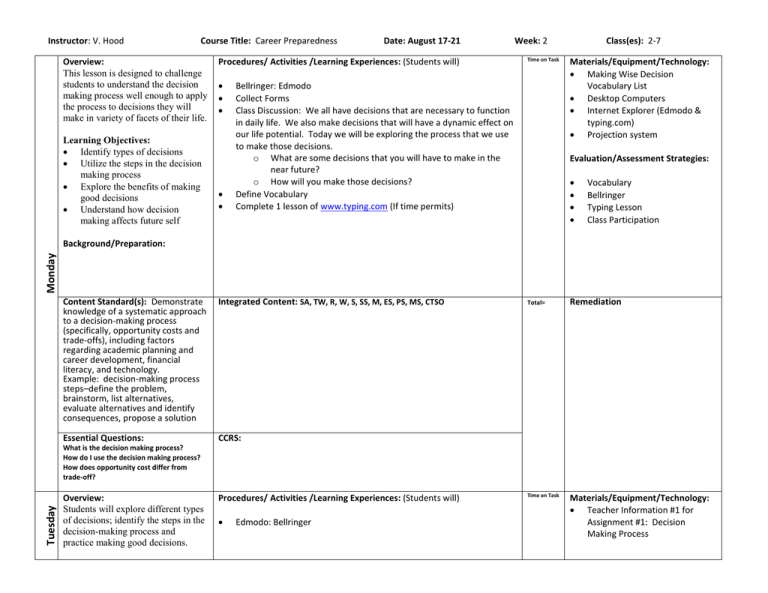
Instructor: V. Hood Course Title: Career Preparedness Overview: This lesson is designed to challenge students to understand the decision making process well enough to apply the process to decisions they will make in variety of facets of their life. Learning Objectives: Identify types of decisions Utilize the steps in the decision making process Explore the benefits of making good decisions Understand how decision making affects future self Date: August 17-21 Procedures/ Activities /Learning Experiences: (Students will) Week: 2 Time on Task Bellringer: Edmodo Collect Forms Class Discussion: We all have decisions that are necessary to function in daily life. We also make decisions that will have a dynamic effect on our life potential. Today we will be exploring the process that we use to make those decisions. o What are some decisions that you will have to make in the near future? o How will you make those decisions? Define Vocabulary Complete 1 lesson of www.typing.com (If time permits) Class(es): 2-7 Materials/Equipment/Technology: Making Wise Decision Vocabulary List Desktop Computers Internet Explorer (Edmodo & typing.com) Projection system Evaluation/Assessment Strategies: Vocabulary Bellringer Typing Lesson Class Participation Monday Background/Preparation: Content Standard(s): Demonstrate knowledge of a systematic approach to a decision-making process (specifically, opportunity costs and trade-offs), including factors regarding academic planning and career development, financial literacy, and technology. Example: decision-making process steps–define the problem, brainstorm, list alternatives, evaluate alternatives and identify consequences, propose a solution Integrated Content: SA, TW, R, W, S, SS, M, ES, PS, MS, CTSO Essential Questions: CCRS: Total= Remediation Time on Task Materials/Equipment/Technology: Teacher Information #1 for Assignment #1: Decision Making Process Tuesday What is the decision making process? How do I use the decision making process? How does opportunity cost differ from trade-off? Overview: Students will explore different types of decisions; identify the steps in the decision-making process and practice making good decisions. Procedures/ Activities /Learning Experiences: (Students will) Edmodo: Bellringer Instructor: V. Hood Course Title: Career Preparedness Learning Objectives: Identify types of decisions Utilize the steps in the decision making process Explore the benefits of making good decisions Understand how decision making affects future self Background/Preparation: Date: August 17-21 Week: 2 Class Activity: Ask students about decisions they have to make and have them go through the decision making process with the class for their decisions. View PowerPoint #1: Decision Making Process and discuss in detail explaining each bullet point of each slide. Student Activity: Distribute Assignment #1: Decision Making Process and allow students time to complete the assignment (15-20 minutes or assign as homework). Stress to the students that this assignment is not about the decision they make, but more about how they reach the decision. Explain to them that it is VERY important that they follow the decision making process to reach their decision. STRESS to the students that this is NOT a right or wrong answer assignment. The goal is to use the decision making process properly regardless of the decision reached. (This can be an in-class or out-of-class assignment.) Content Standard(s): Demonstrate knowledge of a systematic approach to a decision-making process (specifically, opportunity costs and trade-offs), including factors regarding academic planning and career development, financial literacy, and technology. Example: decision-making process steps–define the problem, brainstorm, list alternatives, evaluate alternatives and identify consequences, propose a solution Integrated Content: SA, TW, R, W, S, SS, M, ES, PS, MS, CTSO Essential Questions: CCRS: What is the decision making process? How do I use the decision making process? How does opportunity cost differ from tradeoff? *Provisions for individual differences will be made based upon specifications in the student’s Career/Tech Implementation Plan. Available Industry Credential: Course/Program Culminating Product: Class(es): 2-7 PowerPoint #1: Decision Making Process Assignment #1: Decision Making Process Student Computers Projection system Evaluation/Assessment Strategies: Total= Edmodo Assignment 1: Decision Making Process Class Participation Remediation Instructor: V. Hood Course Title: Career Preparedness Overview: Students will explore different types of decisions; identify the steps in the decision-making process and practice making good decisions. Wednesday Learning Objectives: Identify types of decisions Utilize the steps in the decision making process Explore the benefits of making good decisions Understand how decision making affects future self Date: August 17-21 Procedures/ Activities /Learning Experiences: (Students will) Bellringer: Edmodo Present the Making Wise Decision PPT presentation Students will take notes using the Making Wise Decisions Note Taking Guide. If time permits students will complete a lesson on typing.com Week: 2 Time on Task Class(es): 2-7 Materials/Equipment/Technology: Student Computers Edmodo Making Wise Decision PPT Routine or Major Decision activity cards Three post it notes per student Evaluation/Assessment Strategies: Class Participation Bellringer Note Taking Guide Background/Preparation: Content Standard(s): Demonstrate knowledge of a systematic approach to a decision-making process (specifically, opportunity costs and trade-offs), including factors regarding academic planning and career development, financial literacy, and technology. Example: decision-making process steps–define the problem, brainstorm, list alternatives, evaluate alternatives and identify consequences, propose a solution Integrated Content: SA, TW, R, W, S, SS, M, ES, PS, MS, CTSO Essential Questions: CCRS: Total= Remediation Time on Task Materials/Equipment/Technology: Student Computers Edmodo Making Wise Decision PPT Routine or Major Decision activity cards Three post it notes per student Thursday What is the decision making process? How do I use the decision making process? How does opportunity cost differ from tradeoff? Overview: Students will explore different types of decisions; identify the steps in the decision-making process and practice making good decisions. Learning Objectives: Identify types of decisions Procedures/ Activities /Learning Experiences: (Students will) Bellringer: Edmodo Present the Making Wise Decision PPT presentation Students will take notes using the Making Wise Decisions Note Taking Guide. If time permits students will complete a lesson on typing.com Instructor: V. Hood Course Title: Career Preparedness Date: August 17-21 Week: 2 Class(es): 2-7 Evaluation/Assessment Strategies: Class Participation Bellringer Note Taking Guide Utilize the steps in the decision making process Explore the benefits of making good decisions Understand how decision making affects future self Background/Preparation: Content Standard(s): Demonstrate knowledge of a systematic approach to a decision-making process (specifically, opportunity costs and trade-offs), including factors regarding academic planning and career development, financial literacy, and technology. Example: decision-making process steps–define the problem, brainstorm, list alternatives, evaluate alternatives and identify consequences, propose a solution Integrated Content: SA, TW, R, W, S, SS, M, ES, PS, MS, CTSO Essential Questions: CCRS: What is the decision making process? How do I use the decision making process? How does opportunity cost differ from tradeoff? *Provisions for individual differences will be made based upon specifications in the student’s Career/Tech Implementation Plan. Available Industry Credential: Course/Program Culminating Product: Total= Remediation Instructor: V. Hood Course Title: Career Preparedness Overview: Students will explore different types of decisions; identify the steps in the decision-making process and practice making good decisions. Procedures/ Activities /Learning Experiences: (Students will) Week: 2 Time on Task Bellringer: Edmodo Student will take an assessment on the vocabulary given earlier in the week. Complete the Making Wise Decisions Reinforcement Worksheet Students will complete 1 Lesson on the typing.com website. Class(es): 2-7 Materials/Equipment/Technology: Edmodo Typing.com Student computers Making Wise Decisions Reinforcement Worksheet Evaluation/Assessment Strategies: Bellringer Vocabulary Test Worksheet Typing Friday Learning Objectives: Identify types of decisions Utilize the steps in the decision making process Explore the benefits of making good decisions Understand how decision making affects future self Background/Preparation: Date: August 17-21 Content Standard(s): Demonstrate knowledge of a systematic approach to a decision-making process (specifically, opportunity costs and trade-offs), including factors regarding academic planning and career development, financial literacy, and technology. Example: decision-making process steps–define the problem, brainstorm, list alternatives, evaluate alternatives and identify consequences, propose a solution Integrated Content: SA, TW, R, W, S, SS, M, ES, PS, MS, CTSO Essential Questions: CCRS: What is the decision making process? How do I use the decision making process? How does opportunity cost differ from tradeoff? Total= Remediation Instructor: V. Hood Course Title: Career Preparedness Date: August 17-21 Provisions for individual differences will be made based upon specifications in the student’s Career/Tech Implementation Plan. Available Industry Credential: Course/Program Culminating Product: Week: 2 Class(es): 2-7
